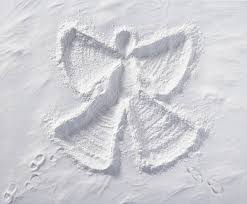
Many novels follow a circular pattern, much like the hero’s journey that Joseph Campbell made famous. But what of the anti-hero’s journey? Or a world with journeys that lack any heroes? Can they start in one place, go out on their fraught arcs, and return, too, changed irrevocably?
The questions come to mind when reading Carolyn Forché’s poem “Selective Service.” It starts with the most innocent of images: the snow angel. It ends with angels, too. But in 26 lines, the definition of angelic bends a bit.
Writing a circular poem like this means that the beginning and end — similar, yet not — are only half the battle. It’s what comes between that matters.
Selective Service
Carolyn Forché
We rise from the snow where we’ve
lain on our backs and flown like children,
from the imprint of perfect wings and cold gowns,
and we stagger together wine-breathed into town
where our people are building
their armies again, short years after
body bags, after burnings. There is a man
I’ve come to love after thirty, and we have
our rituals of coffee, of airports, regret.
After love we smoke and sleep
with magazines, two shot glasses
and the black and white collapse of hours.
In what time do we live that it is too late
to have children? In what place
that we consider the various ways to leave?
There is no list long enough
for a selective service card shriveling
under a match, the prison that comes of it,
a flag in the wind eaten from its pole
and boys sent back in trash bags.
We’ll tell you. You were at that time
learning fractions. We’ll tell you
about fractions. Half of us are dead or quiet
or lost. Let them speak for themselves.
We lie down in the fields and leave behind
the corpses of angels.
And so the traditional, circular arc is as viable an option for poets as it is for novelists. Here Forché shows just how effective it can be.
Have a before and after, happily ever or not? Think about putting it to pen. You might even start in the middle and work your way forward and backward.






